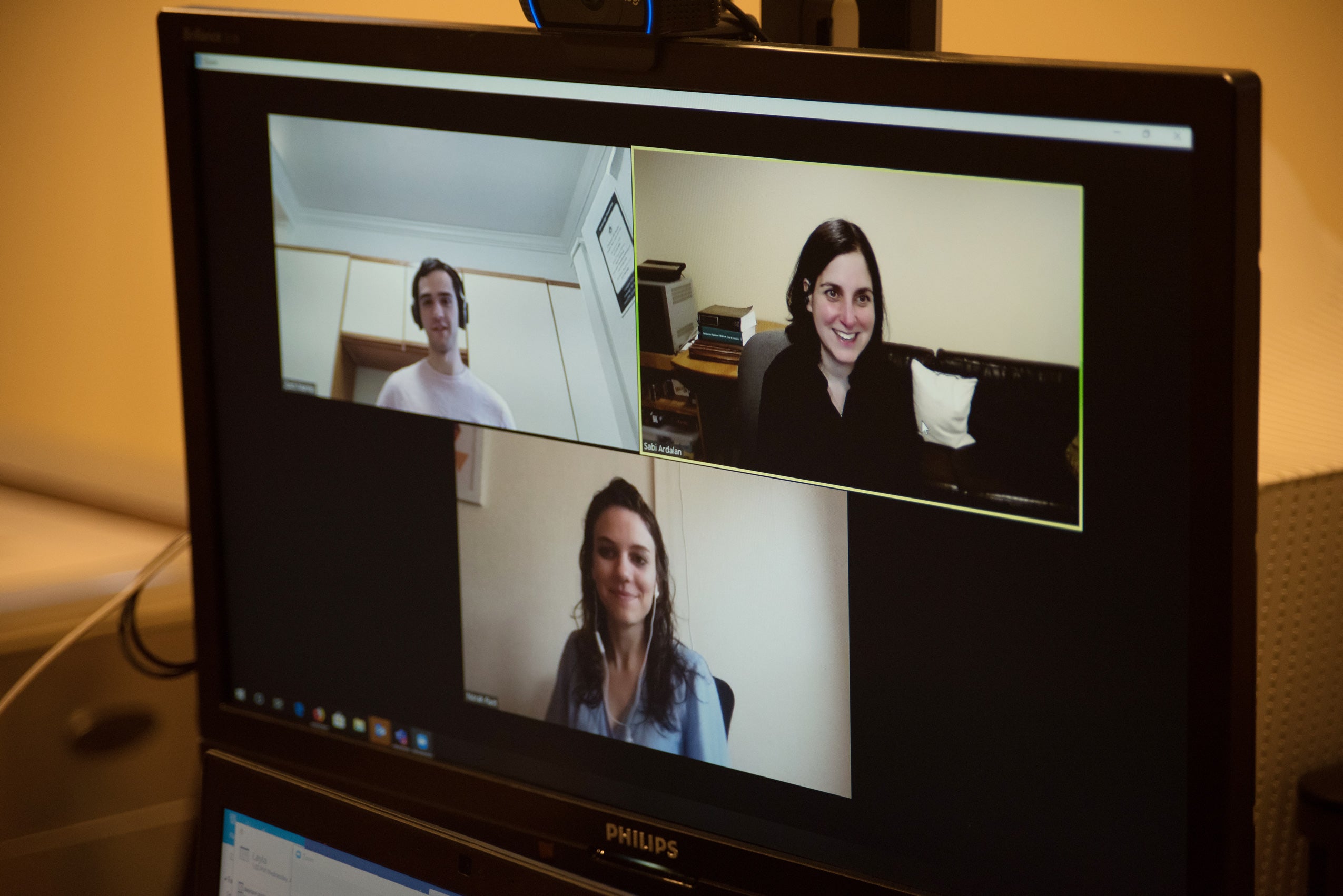For the Clinical Program at Harvard Law School, the past weeks of the COVID-19 pandemic have been a time to mobilize. As the clinics have moved to working remotely, their work has continued with new urgency—and often, with new challenges as well.
“The Law School’s clinics and student practice organizations have been incredibly nimble in their ability to continue to advocate for their existing clients and also to take on the emerging legal needs of community members related to the COVID-19 outbreak,” says Dan Nagin, Clinical Professor of Law and Vice Dean for Experiential and Clinical Education. “Clinical directors and supervisors and their students are using a variety of technology—from Zoom to FaceTime to telephone—to be accessible to each other and to their client communities, and to meet the pressing legal needs of the most vulnerable. Many courts and agencies have ongoing and active dockets and are conducting hearings remotely, and students, staff, and faculty at clinics and student practice organizations across HLS are continuing to do critical work in a variety of legal areas.”
“This work also includes absolutely vital policy advocacy by clinics to ensure that governmental responses to the pandemic take into account questions of equity and access to healthcare, financial assistance, and other supports,” Nagin added.
Each clinic has also adapted to working online. “Zoom is our new best friend,” says Clinical Professor Robert Greenwald, faculty director of the Center for Health Law and Policy Innovation (CHLPI). “I’ve learned to teach online, and I’m now a savant at Google Docs. I have AirPods attached to my head for 12-15 hours each day. But we’ve adjusted.”
CHLPI, he says, remains on the front line of advocating for the care and treatment of low-income populations. “We are working to secure testing and treatment, as well as all other necessary health care, for those who are most vulnerable, including many people living with AIDs, racial and ethnic groups that are historically disenfranchised, and the growing number of people who are uninsured.”
The work involves numerous efforts on both the local and national levels. They have called on the Trump administration to use its emergency authority to allow for early and extended drug refills, and to fill gaps in the next stimulus package, including an increase in Medicaid funding and an extension of no-cost testing and treatment. They are also working with several partners, such as Feeding America and the national Food is Medicine Coalition, to address the food and nutrition needs of vulnerable populations. And they are working to promote equal health access within Massachusetts, calling on Governor Charlie Baker to collect and publish testing data related to race and ethnicity to identify the hardest-hit groups.
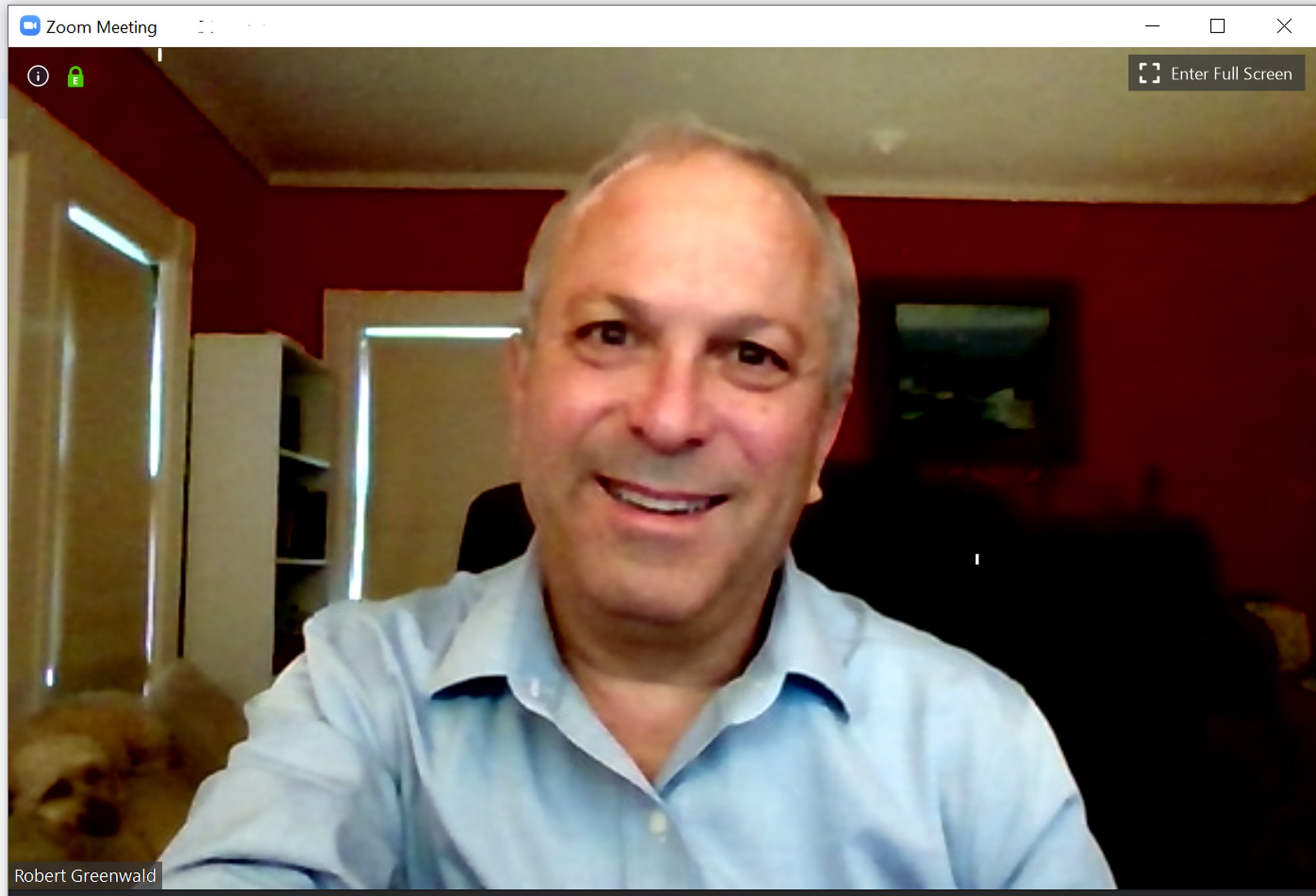
CHLPI has also taken on the challenge of preserving the Affordable Care Act. Two students, Isaac Green ’22 and Will Dobbs-Allsopp ’20, are currently working to get the Trump administration and 18 state attorneys general to withdraw from a Supreme Court challenge to the ACA. Though the administration seems determined to overturn the act, Dobbs-Allsopp says, grassroots efforts on the local level could make the difference. The clinic is planning to work with community health groups in different states.
“At the end of the day, attorneys general are politicians who respond to political pressure. People’s interest in universal health coverage has picked up, and you’re going to see some interesting polling in the next few weeks,” Dobbs-Allsopp says. “They’re realizing that getting rid of this law means the disease will persist and the economy will get even worse.”
In addition to the work we’re doing with individual clients, we are asking what work we can be doing to fight the systemic causes of poverty, so that these issues don’t keep coming up.
Kiah Duggins ’21, Harvard Legal Aid Bureau president
The Harvard Legal Aid Bureau (HLAB) correctly predicted that the virus would disproportionately affect minority and impoverished communities—an idea that is only now beginning to hit the mainstream. HLAB’s President Kiah Duggins ’21, who works closely with HLAB Faculty Director Esme Caramello ’99, cites the inaccuracy of New York Governor Andrew Cuomo’s reference to the virus as “the great equalizer.”
“The narrative is that anyone can get the virus, which is true. But low-income workers are either on the frontlines without adequate protection, or they’re disproportionately in danger of losing their jobs,” Duggins says. “And as the numbers come out, we’re seeing that black people are dying at disproportionately high rates.”
She adds, “This has raised interesting discussions about our mission, because a lot of the issues that Americans are facing because of the crisis have been faced by lower-income people forever. The crisis has elevated that in the public consciousness. So, in addition to the work we’re doing with individual clients, we are asking what work we can be doing to fight the systemic causes of poverty, so that these issues don’t keep coming up.”
This, she says, includes working with Greater Boston Legal Services and City Life/Vida Urbana in Jamaica Plain.
“Even before the crisis we were trying to promote racial and economic justice, to empower those communities directly,” Duggins says. “And the crisis has made it clear how the causes and consequences of poverty affect these communities. So we’re now able to get things done, like an eviction moratorium or rent suspension. People who weren’t supportive before are supportive now because it affects a broader swath of people.”
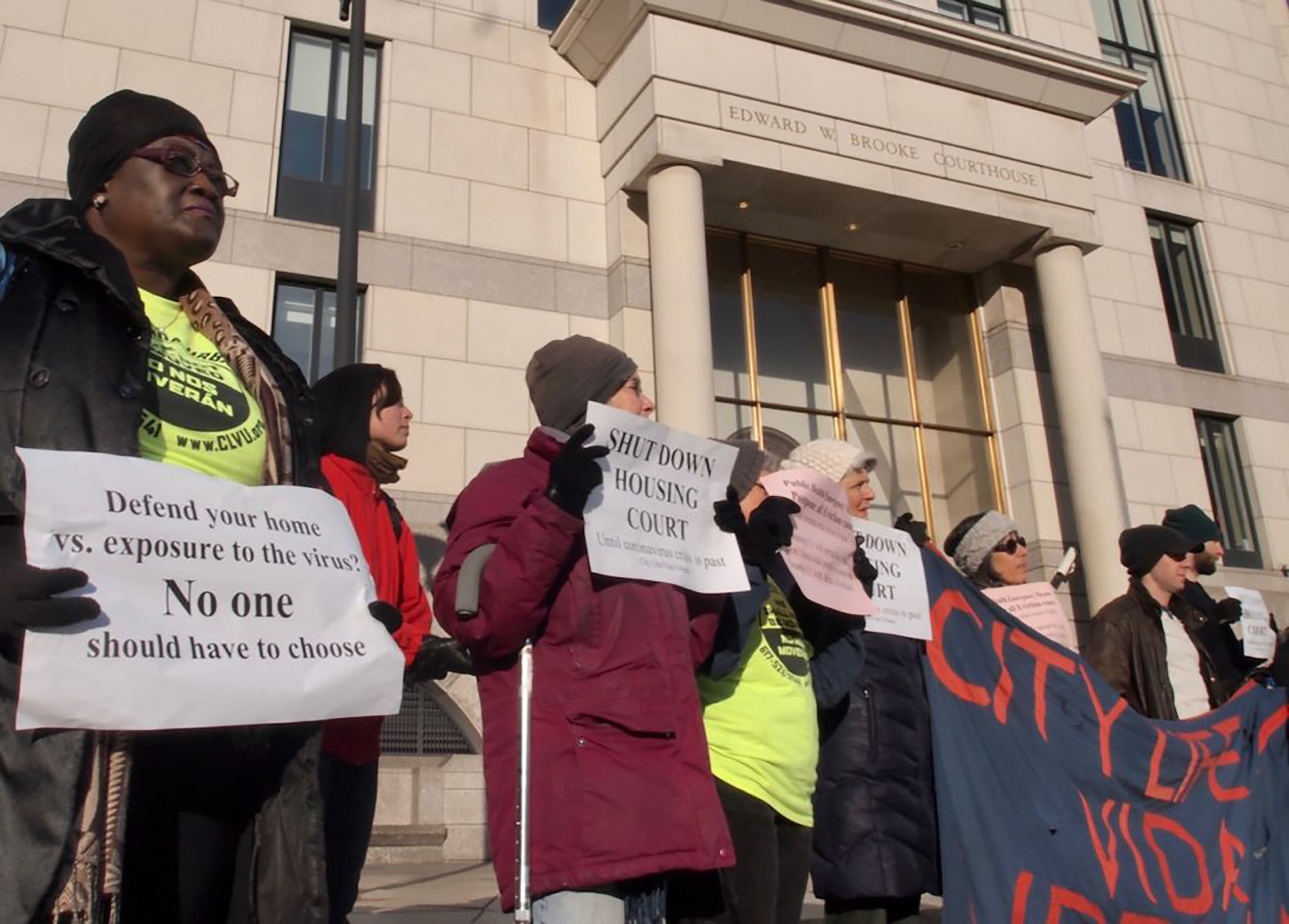
HLAB has also been working to help the University support lower-income Harvard students who were approved to continue living in on-campus housing. “Many of the members of HLAB are lower-income and people of color, so the worlds are more interconnected than you might think. We want to make sure we’re creating healthy lawyers,” Duggins says.
The Harvard Immigration and Refugee Clinic (HIRC) is continuing its mission of advocating for immigrant justice. And it’s now, more than ever, trying to respond to the health-threatening conditions within immigration detention centers.
“We’re continuing our work on behalf of clients, including litigation and policy advocacy,” says HIRC Director and Clinical Law Professor Sabrineh Ardalan ’02. “We’re focusing on getting clients out of immigration detention, given the conditions and risks of being detained right now due to COVID-19.”
One of the HIRC clients, she notes, is an asylum seeker detained at the Stewart Detention Center in Georgia, where conditions are dire. “He sleeps in a room with more than 60 people in bunk beds, so there is no social distancing. At meals, they sit four to a table and he works in food prep, where there are 30-40 people who work the shift. Very few guards have protective gear, and there are documented reports of officials and immigrants with COVID-19 in the facility.”
Circumstances in Massachusetts detention facilities, Ardalan says, are also dismal. The Crimmigration Clinic, directed by Phil Torrey, has filed habeas petitions to seek the release of two immigrant clients detained at the Franklin County House of Correction in Greenfield, Mass. The petitions argue that these individuals are being held in violation of their Fifth Amendment rights and both have lodged claims concerning potential COVID-19 exposure. Sarah Libowsky ’20 and Michael Hur ’20 are tentatively scheduled to argue one of the habeas petitions on April 16 before Judge Mark G. Mastroianni, in the U.S. District Court for the District of Massachusetts.
Similarly, the Harvard Immigration and Refugee Clinic at Greater Boston Legal Services, led by Nancy Kelly and John Willshire Carrera, joined the American Civil Liberties Union of New Hampshire in filing an emergency federal habeas lawsuit on behalf of an indigenous Guatemalan asylum seeker detained in Strafford, New Hampshire, and managed to secure his release from detention.
HIRC attorneys and its social work team are also trying to respond to the needs of immigrant clients who are not detained, but who are in precarious circumstances due to COVID-19. “Some are worried about how to pay rent and feed their families. Others are still going to work, because remote work isn’t an option, and their health is at risk because of it,” Ardalan says. Immigrant families may be afraid to access the health care and services they need, due to concerns about immigration enforcement.
HIRC has joined the Massachusetts Law Reform Institute and Prisoners’ Legal Services of Massachusetts, among dozens of other organizations, in submitting a letter to Immigration and Customs Enforcement (ICE) and local county sheriffs and jail wardens of the facilities that contract with ICE, urging them to cease local immigration enforcement operations and arrests and release immigrants in custody in light of the pandemic.
“It has been very difficult. A variety of lawsuits have been filed across the country with mixed results,” Ardalan says. One encouraging sign, she says, is that some local courts and officials have proved willing to step in and order immigrants’ release from detention. “I hope that all our advocacy efforts will bear fruit, because circumstances are so dire.”
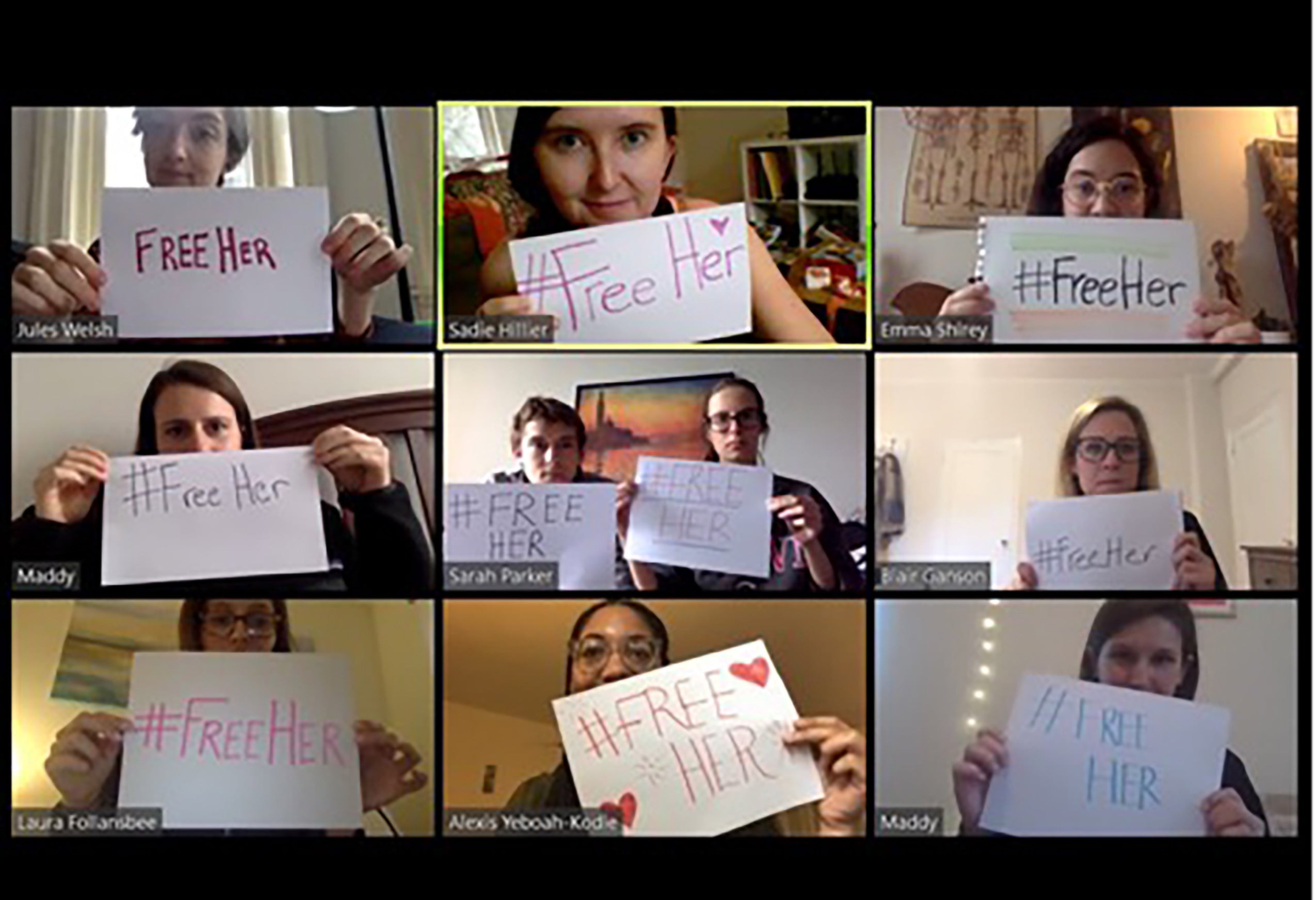
The Harvard Prison Legal Assistance Project (PLAP) has also been working to keep incarcerated people safe from COVID-19. PLAP hosted a Zoom phone bank on April 3 as part of the Massachusetts week of action, organized by Families for Justice as Healing and the National Council for Incarcerated and Formerly Incarcerated Women and Girls. PLAP is calling on district attorneys, sheriffs, the governor, elected representatives, and the Massachusetts Department of Corrections to demand immediate release of vulnerable inmates who pose no public risk to protect the incarcerated community from COVID-19.
Harvard’s Federal Tax Clinic has remained busy even as the IRS itself has largely shut down. That means pressing forward with cases that were underway before the pandemic hit. “We deal with people having some kind of problem with the IRS—either they owe and they need to work out payments, or the IRS says they owe more than they think,” says Clinic Director T. Keith Fogg. Clients are currently having difficulty reaching anyone at the IRS—which has closed its last operating service center, causing cases in the administrative stage to be put on hold. Yet cases in court are still moving forward remotely, so there is still plenty of work for clinic students.
The clinic is also working with direct consequences of the pandemic, including laying some groundwork for the post-recovery era. For one thing, Fogg says, we can probably expect a shift to more email filing and electronic signatures in the future. And the recent implementation of the CARES act, which provides a $1200 rebate to some workers, has also opened work possibilities.
“We’ve been talking a fair amount to people at the IRS about implementing their procedures during the crisis, and explaining to the community what new provisions mean,” Fogg says. The clinic is already engaged in advocacy to reduce the number of people who need to file a tax return to receive the rebate (the IRS has already exempted regular social security recipients). Advocacy efforts are ongoing to exempt recipients of Supplemental Security Income and Veterans benefits who desperately need the financial help.
Faculty and students at the Food Law and Policy Clinic (FLPC) have also stepped up their work during the pandemic, writing briefs aimed at saving tons of food that could feed the hungry, and working to inform the response to COVID-19, including congressional legislation. In the early stages of the crisis, FLPC acted quickly to outline avenues for donating excess food in the wake of campus and business shutdowns to help feed the hungry. Since then, the clinic has developed and amplified several other resources on using food donation to support food banks and other food recovery organizations, which are facing both an increase in demand and limited resources.
“There are already so many people who were in vulnerable situations,” says Emily Broad Leib ’08, director of FLPC and deputy director of the Harvard Law School Center for Health Law and Policy Innovation. “The crisis has exacerbated food access challenges for those people, and it has added so many more individuals and families in need. Workers are losing jobs, especially those doing hourly work—many, in fact, who work in the food industry. We are going to see a huge increase in people who suddenly need help getting basic needs met, especially food.”
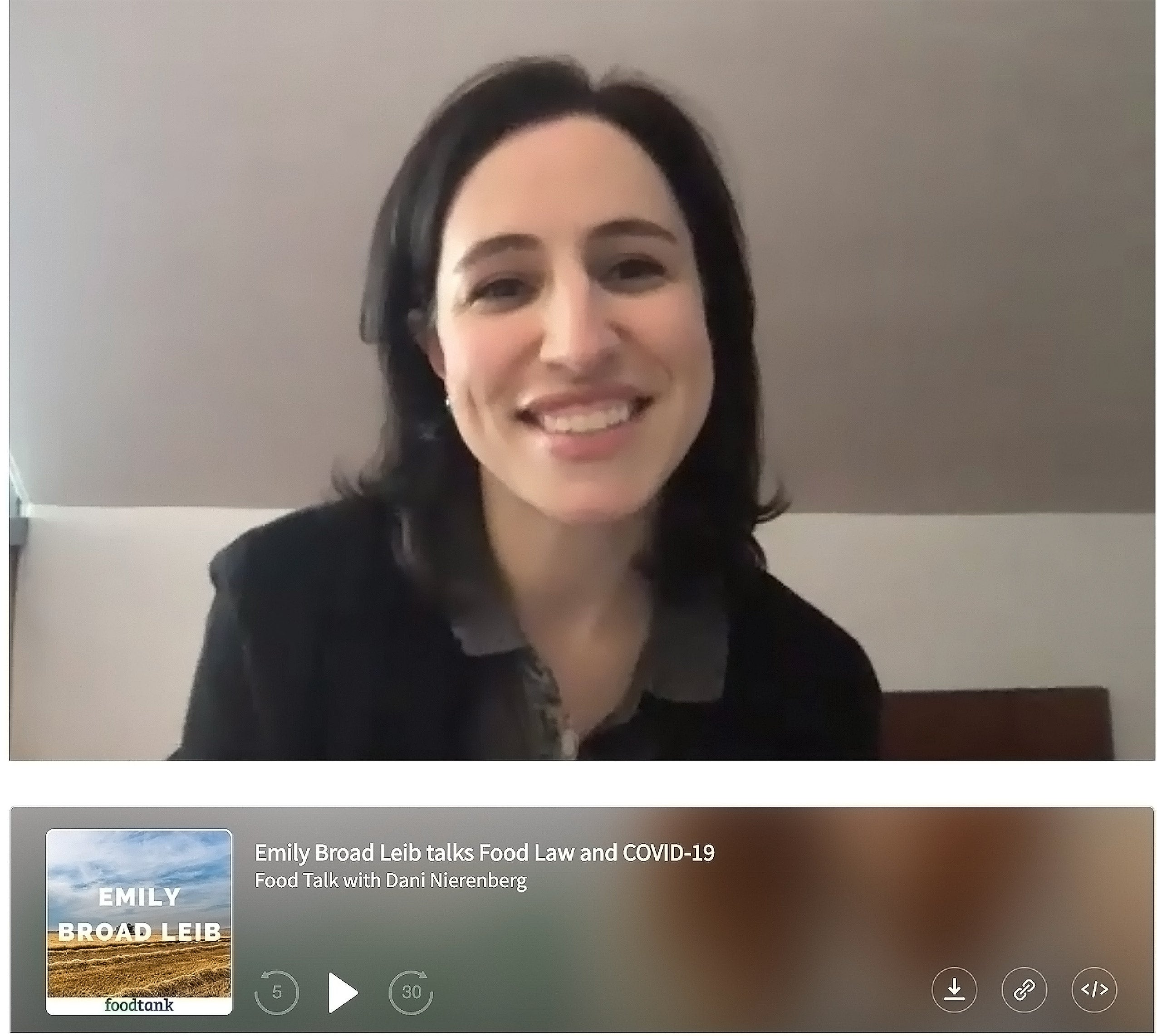
The FLPC has also responded to new concerns about food safety by preparing an issue brief with recommendations for federal and state governments to facilitate food delivery during the crisis using existing food assistance programs, such as the Supplemental Nutrition Assistance Program (SNAP) and the Special Supplemental Nutrition Program for Women, Infants, and Children (WIC).
They also have come up with proposals for getting food from food banks and other organizations delivered directly to people’s doors, and for getting Congress to support these community-based food delivery organizations. Their recommendations include investments in technologies that connect food donors to recovery organizations.
“We make the point that these technologies can be really responsive to the challenges of the moment,” says Broad Leib, “but most of them have been developed by small nonprofits. Helping them scale up quickly to meet the needs of the growing number of people who need food support is going to require an investment.”
